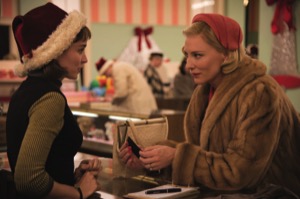
Todd Haynes’ 2002 film Far from Heaven was a melodramatic homage to Douglas Sirk’s sweeping, nearly camp 1950s domestic dramas like Imitation of Life and All that Heaven Allows. While Far from Heaven certainly works on its own terms – Julianne Moore’s forbidden romance with Dennis Haysbert is archly gorgeous – it was hard not to think of it as much more than an artistic exercise in adulation. His remake of Mildred Pierce for HBO was a similar thing, just more expensive and less necessary. But with Carol, he has taken a classic 1950s love story and crafted it into something new, indelible and sublime.
Carol is based on Patricia Hightower’s 1952 classic lesbian romance The Price of Salt. The novel has been beloved by lesbians in particular since its initial publication because it was one of the first not to treat the main characters’ orientation as a tragic disease; it was not a finger-wagging warning to avoid temptation, but a proper romance. Haynes has done for The Price of Salt what Sirk and Michael Curtiz (among others) did for novels of the era about star-crossed heterosexual lovers. I doubt everyone would agree with me, but I believe that Carol could be American lesbians’ Brokeback Mountain, a perfect film that depicts same-sex love with loving respect.
Carol, played with aching beauty by Cate Blanchett, is a wealthy suburban wife in the midst of a divorce from her husband Harge, played by Kyle Chandler. The marriage is ending because she prefers women, and he knows this, but cannot accept it. Rooney Mara plays Therese, a shop girl from whom Carol buys roller skates for her and Harge’s daughter; Carol and Therese have an instant attraction, confusing to the young Therese and intriguing for the more experienced Carol. But because it is the early 1950s, this relationship is neither accepted nor easily entered into. They are mutually seductive and hesitant, and Harge is quietly and then loudly enraged. He is trying to force Carol to choose between her daughter and her love for women, specifically Therese.
Structurally, Carol is a typical girl-meets-girl, girl-loses-girl, etc. love story. But nothing about the film is typical. Art directed so that every period prop and lipstick color adds to the scenes’ mood and symbolism, Carol rewards intense viewing. Blanchett’s sly, wise, and only just barely vulnerable performance, among her best (which is saying something about the two-time Oscar winner), makes her as seductive to the audience as she is to Therese. Haynes photographs her as a noir Botticelli. I wanted to become a lesbian and enter the film just for the possibility that Carol might be interested in me. (Doubtful, I know.)
Mara, who won the Best Actress award at Cannes for playing Therese, has a fuller arc as a character and more opportunity to shift, change and express wonder, love and grief. It’s also a perfect performance, as sweet and sympathetic as Blanchett’s is luminous and grand.
Carol
Directed by Todd Haynes
Written by Phyllis Nagy
Starring Cate Blanchett, Rooney Mara and Kyle Chandler
Rated R because the MPAA thinks lesbians are scary
Opens Dec. 25 at Landmark Hillcrest











